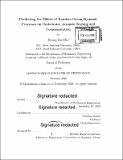Predicting the effects of random ocean dynamic processes on underwater acoustic sensing and communication
Author(s)
Cho, Byung Gu.
Download1155111869-MIT.pdf (10.57Mb)
Other Contributors
Massachusetts Institute of Technology. Department of Mechanical Engineering.
Advisor
Nicholas Makris.
Terms of use
Metadata
Show full item recordAbstract
Acoustics is the primary means of sensing and communication in the ocean for humans and many marine animals. Natural fluctuations in the ocean, however, degrade these abilities in ways that have been previously difficult to forecast. In this thesis, we address this issue by predicting sensing and communication degradation in terms of acoustic attenuation, dispersion and temporal decorrelation at typical operational ranges and frequencies in continental-shelf environments. This is done with analytic expressions derived from first physical principles. The analytic expressions provide the statistics of the acoustic field after forward propagating through an ocean waveguide containing 3-D random inhomogeneities from the independent or combined effects of rough sea-surfaces, near-sea-surface air bubbles and internal waves. The formulation also includes Doppler effects caused by the inhomogeneities' random horizontal motion, enabling modeling and prediction over a wide range of environments and frequencies. Theoretical predictions are confirmed with available acoustic measurements in several continental-shelf environments using standard oceanographic measurements for environmental support. We quantify how the acoustic signals decorrelate over timescales determined by the underlying temporal coherence of ocean dynamic processes. Surface gravity waves and near-sea-surface air bubbles decorrelate acoustic signals over seconds or less, whereas internal waves affect acoustic coherence at timescales of several to tens of minutes. Doppler spread caused by the inhomogeneities' motion further reduces acoustic temporal coherence, and becomes important at the high frequencies necessary for communication and fine-scale sensing. We also show that surface gravity waves and bubbles in high sea states can cause increasingly significant attenuation as frequency increases. The typical durations of marine mammal vocalizations that carry over great distances are found to be consistent with the coherence timescales quantified here and so avoid random distortion of signal information even by incoherent reception.
Description
Thesis: Ph. D., Massachusetts Institute of Technology, Department of Mechanical Engineering, 2020 Cataloged from PDF version of thesis. Includes bibliographical references (pages 103-108).
Date issued
2020Department
Massachusetts Institute of Technology. Department of Mechanical EngineeringPublisher
Massachusetts Institute of Technology
Keywords
Mechanical Engineering.